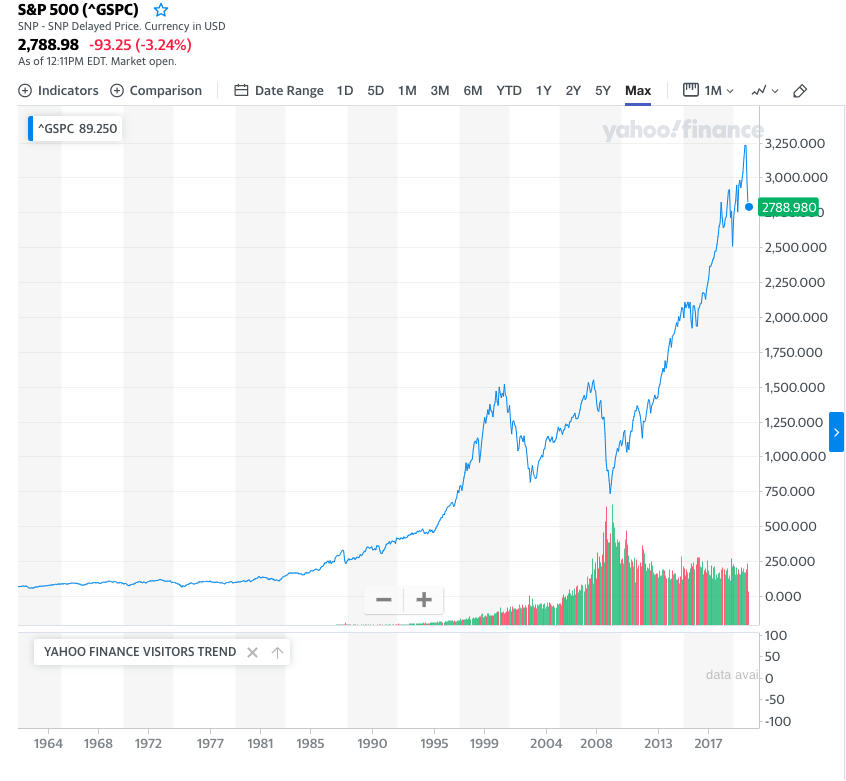3 things to remember about investing in a turbulent market
The coronavirus has sent markets into a chaos not seen since the financial crisis back in 2008.
Goldman Sachs is saying the bull market is over and that stocks might continue to fall a great deal more until they bottom out.
For average investors, like people saving for retirement, big market gyrations can be scary. For millennials, especially, this may be the first time they’ve experienced the bottom fall out of the market.
Here are three important things that anyone investing should keep in mind.
1. Retirement savers should breathe — even if they’re close to retirement — before they do something they might regret
As Warren Buffett’s mentor, Benjamin Graham, always used to say, are you a “speculator,” or are you an “investor”?
No one knows what the market is going to do tomorrow, a month from now, or next year — even the people on TV who get paid to “know.”
But over the long haul, there is almost universal consensus that the American economy — represented by something like an S&P 500 or a total market index fund for example — will keep on chugging up and to the right on the stock chart.
There is a reason why the big brokerage firms, including Fidelity, Vanguard, and T. Rowe Price — which hold $9 trillion combined — are telling people to “stay the course.”

“We preach diversification so you can weather these tough times and stay invested,” the CEO of Vanguard said in a recent video.
People who don’t know much about investing often opt for a target date fund, because it’s often the default option in 401(k)s. There’s a reason: it has built-in diversification. This can be key: Fidelity said in December that 57% of boomers who manage their own money ought to rebalance their portfolios.
Diversification is an important concept, and it means that when the U.S. stock market is down, other assets in a portfolio – be it municipal bonds or an emerging market fund – will help cushion the broader market’s fall.
For young people saving for retirement, sharp drops aren’t a big deal. There will be many ups and downs in the market before they retire — a long way from now.
And since no one knows the future, experts recommend staying invested even in bad times. When being overly conservative, it’s really easy to miss out on the good days, and missing out on the good market days really costs investors over the long run.

Here is a picture of the performance of the S&P 500 index since 1960. There are plenty of teeth, large and small, in this line, but the trend is hard to miss. That’s why all these people preach “staying the course.”
2. People near retirement probably should have stocks in their portfolio
There’s been plenty of advice echoing point number one. Long-term investors should buy and hold. But one misconception has to do with people close to retirement. These investors may not seem like long-term investors, so it’s easy to see why a “stay the course” approach might seem inappropriate.
But even people in retirement are still long-term investors. Though retirees might be about to spend — or are spending — their nest egg, they’re not spending all of it, and they’ll probably need to stay invested.
As you get near retirement, the allocation of stocks in your portfolio doesn’t usually go to zero. A retirement isn’t a singular moment in time, but a long period of over 20 years— which is getting longer as life expectancy grows.
For someone who’s near retirement, their portfolio breakdown should be more than half equities. Vanguard’s 2020 target date fund (VTWNX), for example, is 55% stocks and 45% bonds. Experts say someone planning to retire this year should certainly be exposed to the stock market.
3. It’s not always all bad when the stock market is down
Long-term investors expect the stock market to go up. If you had a time machine and could say for certain when the market was about to go down and about to go up, you could theoretically make a little more money.
But there is no time machine. That’s why people dollar-cost average (DCA). If you have a 401(k), you already dollar-cost average, an investing strategy that essentially neutralizes market volatility by investing regularly at intervals; if you make automatic contributions to a 401(k) plan, you are regularly purchasing mutual funds or index funds regardless of their price. When stocks are down, you get more shares for your money. When stocks are up, the shares you bought when they were cheaper are worth more.
This approach takes some of the risk out of the market, helping people avoid accidentally timing the market.
And for 20- and 30-somethings, who have a long time horizon before retirement, a market that’s down can be good news – they’ll get to buy more shares cheaply that will eventually be worth more.
-
Ethan Wolff-Mann is a writer at Yahoo Finance focusing on consumer issues, personal finance, retail, airlines, and more. Follow him on Twitter @ewolffmann.
Why it's important to still own stocks at retirement — even now
Investors make Warren Buffett-like moves amid coronavirus crisis
Fidelity, Vanguard, T. Rowe Price to investors: 'Stay the course'
Why the US economy is particularly sensitive to the coronavirus outbreak
9 key dates when we’ll know more about how how coronavirus is effecting the economy
Coronavirus price gouging: 3 charts show Amazon's wild spikes
The 'best-case' coronavirus scenario: people don't all get sick at once
Read the latest financial and business news from Yahoo Finance
Follow Yahoo Finance on Twitter, Facebook, Instagram, Flipboard, LinkedIn, YouTube, and reddit.